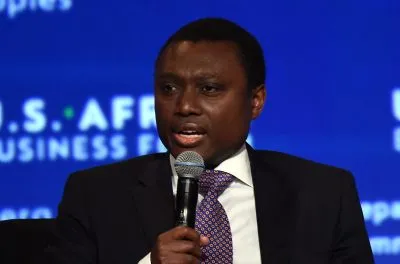South Africa’s Finance Minister, Pravin Gordhan, ends government spending binge or rather he will try. The Finance Minister has been swinging the axe and chopping off the huge expenses perks that politicians and top government officials have so far enjoyed. The aim is to claw back the national debt as well as instil some discipline in what many consider reckless spending by the bureaucracy. Tom Nevin gives the details.
South Africa’s Finance Minister, Pravin Gordhan, was in sombre mood when he delivered his medium-term budget policy statement to Parliament. The news was not good, he said, with debt becoming more unruly by the day, the budget deficit dropping another couple of points and the balance of payments showing South Africa was importing more than it was exporting. It was glum stuff.
Then the Minister’s countrymen cheered up immeasurably when he announced that he would claw back at least R2bn ($200m) a year from his top brass in the government by clipping their prodigal and reckless spending of taxpayers’ money.
“As government, we acknowledge that we too must provide value for money. Although most government spending is effectively managed, there are many opportunities to cut or minimise costs and stop abuse. In these difficult times, cabinet has decided to take a number of initiatives which will apply both to members of Cabinet and to officials in national, provincial and local government. This will include state entities and state-owned enterprises.”
The Finance Minister had effectively shunted the government gravy train into a siding. Gone were open-ended state-funded credit cards, first-class travel and accommodation, flashy luxury cars and a clutch of other perks.
This was honesty at its most brutal, leaving cynics and sceptics with little response other to than to point out that a general election is just around the corner and that something spectacular had to be done to stem the tide of the electorate’s anger at government and party high-ups’ profligacy with public money.
Examples abound, with one provincial premier recently spending more than $5,000 in one month at a fast-food outlet round the corner from her office; a minister blew $50,000 to visit his girlfriend in a Swiss prison; and another minister lashed out $70,000 of public funds to take an overseas trip with her boyfriend
Johannesburg-published The Times led the media charge of snappy headlines shouting ‘Happy Hour over’ with a story that opened with: “Taxpayers won’t be treating public servants to a dop (drink) any longer, or forking out a fortune for official vehicles. And the days of swiping official credit cards for fast food binges are over”. ‘Gordhan tightens state’s belt’ riposted The Star while ‘Time, ladies and gentlemen, please’ made a number of appearances.
The unbridled Schadenfreude overshadowed the more serious side of Minister Gordhan’s medium-term budget policy statement designed to save the country billions of rands each year.
In stemming the wasteful flow, the government is sparing no effort to reduce the budget deficit to 3% in 2016–17. The deficit this year is projected at 4.2%.
Expenditure will be restricted to just 2.2% in real terms this year while containing spending growth on wages and goods and services “to stabilise debt”.
A ballooning bureaucratic salaries and wages bill was another reason for the government’s drastic cutbacks on senior members’ spending. A bureaucracy bloated across all economic sectors is consuming billions of rands in pay packets “beyond expectation”, reported the Finance Minister. Spending on personnel now accounts for 39% of non-interest government expenditure while adjustments to clerical salaries would cost an additional $520m over three years.
While this amount was not “a bomb in the framework” of an overall wage bill of $41bn, the government’s fixed spending constraints meant “that there is no back pocket to make available for this”, said budget office head Matthew Simmonds.
The clerical adjustments arose from an agreement made by the Department of Public Service and Administration with public sector trade unions and announced in December 2012. Public sector wages are described in the statement as a key risk to fiscal sustainability with Gordhan reminding government departments of his earlier directive that no further expansion in the number of employees would be funded. “While there is no formal moratorium on hiring more public servants, we are saying there is a limit within which all departments have to work. As people leave they can rehire but departments will have to make their own internal adjustments” said Gordhan.
Meanwhile the perks-cuts programme will be led by President Jacob Zuma himself “from the front”, reported Minister in the Presidency Collins Chabane.
“Once the guidelines have been set out, we’ll then sit and look at the issues that relate to the Presidency as a whole and adjust ourselves accordingly. Minister Gordhan is quite clear that the measures we are taking will be binding throughout the state machinery – including both the provincial and local government.”
Cunning combination
“It was Gordhan at his best,” editorialised Business Day newspaper’s deputy editor Hilary Joffe, “a cunning combination of populist electioneering and fiscal rectitude, with the added advantage that it was clearly punted as a gesture from the Cabinet, not just a bit of spending discipline imposed by the Minister. Whether it will get the right people in the government to do the right things is another matter, as is the question of how much in savings will result.”
Government spending is budgeted to increase by 8.4% in nominal (money) terms this year – against an average of 13% for the preceding decade. The latest medium-term framework provides for real (inflation adjusted) non-interest spending growth of just 2.2% over three years, down from the real 8% average growth rate of 2003–04 to 2011–12.
“So the merry spree is coming to a halt,” says Joffe, “even though Gordhan can legitimately say that 2.2% is still real growth. He is still running an expansionary fiscal policy designed to support the economy and help it through the down-cycle.
“But it is a delicate balance between doing this while keeping the debt burden at a sustainable level, especially in a context in which South Africa’s dual fiscal and current account deficits make it extra vulnerable to the uncertainties of international markets.”
Gordhan warned that unless South Africa saved and invested more, expanded and diversified the economy and accelerated job creation, its aspirations would remain unfulfilled.
“Above all,” he said, “we need faster, inclusive, job-creating growth. Without growth we cannot increase the number of enterprises or create more jobs. Without growth we cannot generate the revenue needed to fund our social programmes, infrastructure investments, and incentives to support important industries.
“We have a duty to broaden opportunities for those who do not have secure incomes, formal jobs, solid homes, electricity, water or access to health care. We have to share the benefits of growth, so that those of our people who are most vulnerable and disadvantaged can say ‘This economy works for me’.
Faster and more inclusive growth calls for greater cooperation and better alignment between labour, business, government and other actors to get things done – hearing each other out, finding solutions, encouraging innovation, building a “smart” South Africa.
Want to continue reading? Subscribe today.
You've read all your free articles for this month! Subscribe now to enjoy full access to our content.
Digital Monthly
£8.00 / month
Receive full unlimited access to our articles, opinions, podcasts and more.
Digital Yearly
£70.00 / year
Our best value offer - save £26 and gain access to all of our digital content for an entire year!

 Sign in with Google
Sign in with Google 




